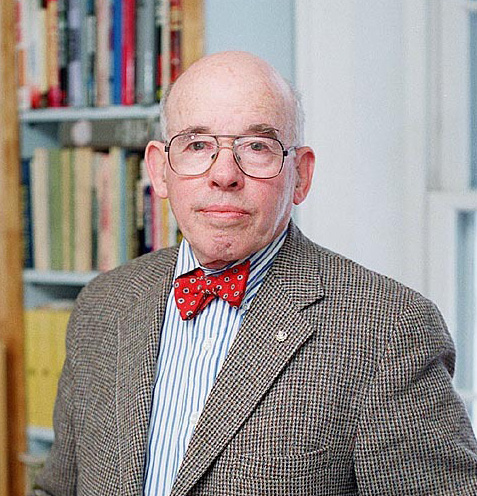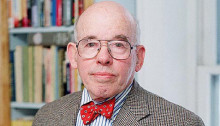Richard Dudman, the former chief Washington correspondent of the St. Louis Post-Dispatch, turned 95 on May 3. I don’t believe in heroes, but Richard Dudman is my hero.

So many reporters and editors get tired, burned out or cynical. Not Dudman. He never has lost his love for a big story or his intrepid pursuit of the truth in the face of danger. Dudman always kept his suitcase packed so that he could make it to the airport before editors back home had second thoughts about the cost of an international trip.
Dudman was captured in Cambodia in 1970 during the Vietnam War and spent 40 days in captivity. Later, in 1978, he was shot at during a visit to Pol Pot and narrowly escaped with his life.
It was vintage Dudman to decide in 1970 to get away from his military handlers and find out what was really going on in the Vietnam War by driving off with two colleagues in the general direction of Phnom Penh. And, after guerrilla fighters surrounded the three, it was vintage Dudman to remark to his colleagues, “If we get out alive, we’re going to have one hell of a good story.”
They did. He wrote a book – “Forty Days with the Enemy.” I remember my young children’s big eyes when Dudman, years later, came to dinner and told them about how he ate dog while a prisoner in Cambodia.
Like many people in public life, Dudman is partly remembered for the enemies he made. They weren’t all in Southeast Asia. Two of the most prominent were President Richard Nixon and the St. Louis Globe-Democrat.
Nixon put Dudman on the “Enemies List,” an honor he richly deserved for his Vietnam coverage and for his efforts in getting his hands on the Pentagon Papers. And then there the conservative Globe’s front-page editorial – “For America or For Hanoi” – essentially calling him a traitor.
Dudman pointed out that patriots question the official line. And friends knew, if they visited him and his wife, Helen, in Maine, that he had a flagpole in his front yard and a sailboat named Freedom.
Dudman once recalled how he got the job in Washington. He said he “impressed city editor Raymond Crowley as being adventuresome and resourceful by driving him to work in the midst of a snowstorm in a war-surplus Jeep and working his way into a St. Louis Work House riot and dictating an eyewitness account.”
That led to assignments covering wars and revolutions in Guatemala, Argentina, the Middle East, Ireland, El Salvador, Dominican Republic, Algeria Laos, China and Vietnam, as well as a posting at the Washington Bureau starting in 1954. He went on to cover Fidel Castro’s revolution in Cuba, the assassination of President John F. Kennedy in Dallas, the invasion of Cuba at the Bay of Pigs and the Watergate scandal.
His motto: “Reporter who sits on hot story gets ass burned.”
Dudman recalled in an email telephoning his friend I.F. Izzy Stone, the liberal muckraker, to try to get the Post-Dispatch a copy of the Pentagon Papers. The call led to instructions to send a reporter to Cambridge, Mass., near Harvard University, and to wait for a call at a phone booth. Dudman sent Tom Ottenad, the paper’s political reporter. Ottenad got the call and instructions to go to another phone booth and then to a porch, where copies of some of the documents were contained under a stack of newspapers. Ottenad rushed to St. Louis to put together a story.
When the WikiLeaks stories broke decades later, some journalists and lawyers were quick to say that the WikiLeaks were entirely different from the Pentagon Papers. Not Dudman He told me, “I welcome the publication of the WikiLeaks papers as a breath of fresh air that tells us a lot more about foreign relations and foreign affairs than do the official statements, with their caution, concealment and frequent hypocrisy.”
Even as Dudman took on establishment Washington, he was part of it. In his trademark bow tie, Dudman was a fixture at the Gridiron Club, where Washington’s media elite parties with Washington’s power elite.
Dudman’s wife, Helen, is Dick’s protector, his intellectual equal and a noted journalist in her own right first as executive women’s editor of the Washington Post and later owner of public radio stations in Maine. She wasn’t particularly a fan of the Gridiron Club, but tells a funny story about having invited J. Edgar Hoover to be her guest at a Washington dinner. Hoover showed up and was delightful.
After “retiring,” Dudman wrote more than a thousand editorials for the Bangor Daily News. He retired from that position last Independence Day.
These days, when the surveys show that the job of newspaper reporter ranks dead last – after maid, garbage man and lumberjack – people might find the antidote in the elixir that Richard Dudman brings to the joyful pursuit of adventure and the truth.
William H. Freivogel is the publisher of Gateway Journalism Review and director of the SIU Carbondale School of Journalism. He is a former editorial page deputy editor for the St. Louis Post-Dispatch and contributes to the St. Louis Beacon. He is a member of the Missouri Bar.
